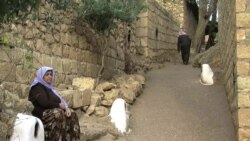Religious minorities are fleeing their homes in northern Iraq to escape Islamic State militants, who are singling them out. Tens of thousands of Christians and members of the Yazidi sect have headed into Kurdistan.
But many are trapped in a mountainous region, with no food and water. The United States has begun airstrikes against the Islamic State fighters, and air drops of food and water.
Two years ago, journalist Henry Ridgwell visited Kurdistan and found that it had become a refuge for religious and ethnic minorities who had long suffered persecution and violence.
There he found that some religious minorities -- most with ancient roots -- say their numbers are now increasing thanks to improving stability and legislation to protect minority rights.
Yazidi worshippers
In the valley of Lalesh, Yazidi worshippers visited their shrine deep in the mountains of Kurdistan. In the cool dusk, a temple priest lit hundreds of candles across the complex, illuminating the ancient buildings and their striking conical stone roofs.
At some point in life, every follower of the Yazidi faith is supposed to make a pilgrimage here.
Long stigmatized as "devil worshippers" by their Muslim and Christian neighbors, Iraq’s half-million strong Yazidi minority suffered some of the worst sectarian attacks after the fall of President Saddam Hussein in 2003.
Now under the autonomous Kurdistan Regional Government, the pilgrims are returning. The Yazidis have their own minister in government.
“Before we were not free to pray and could not visit here easily," said Lokman Suleiman, a Yazidi teacher. "Now we can. The Kurdistan government is not only good for us, it is good for all people. The sun now rises over a Kurdistan of many colors, free and proud.”
Christian revival
Like the Yazidis, Iraqi Christians were targeted by Sunni and Shi'ite militants after the U.S. military ousted Saddam Hussein.
Down in the heat of Irbil city, Father Aesha Dawoud leads an Assyrian church in a suburb of the Kurdistan capital.
“Now our churches and our holy places are honored and respected by the people who live around us,” said Father Aesha. “In celebration and in peace, people come here. The people of this city guard our places of worship.”
There were tens of thousands of Christians living in cities like Baghdad and Basra in southern Iraq. The majority have fled - some overseas, many to Kurdistan.
Father Aesha said his congregation would support an independent Kurdish state.
“If the situation is like now, if they don’t change things for us, then yes we would support the Kurds,” he said.
Many Christians have settled in the town of Ainkawa outside Irbil.
Ragat Hana Yousef moved to Ainkawa from Baghdad after his liquor store there was bombed in 2005.
"Kurdistan is different from the rest of Iraq because now everyone is free to speak," he said. "There is more democracy and what’s most important, it is safe.”
Nearby, a Kurdish barber -- who gave only his first name, Mohamed -- said the people in Kurdistan should unite with the Kurds who now control a large part of Syria.
“It is better for one people to live in one house, not be divided in two,” he said.





